外研版英语八年级上Module 8 Accidents单元测试题(含答案及部分解析,无听力部分)
文档属性
| 名称 | 外研版英语八年级上Module 8 Accidents单元测试题(含答案及部分解析,无听力部分) | 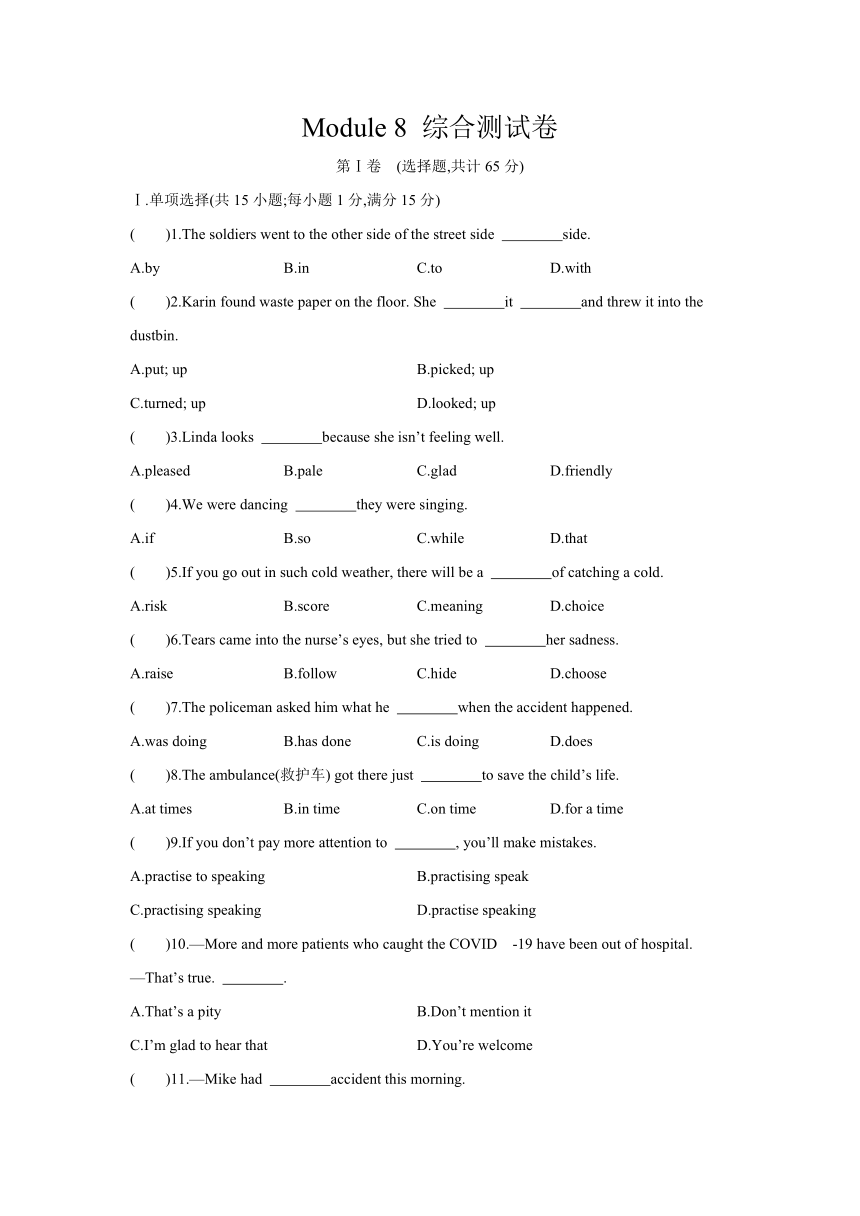 | |
| 格式 | docx | ||
| 文件大小 | 55.6KB | ||
| 资源类型 | 教案 | ||
| 版本资源 | 外研版 | ||
| 科目 | 英语 | ||
| 更新时间 | 2021-07-28 21:14:28 | ||
图片预览

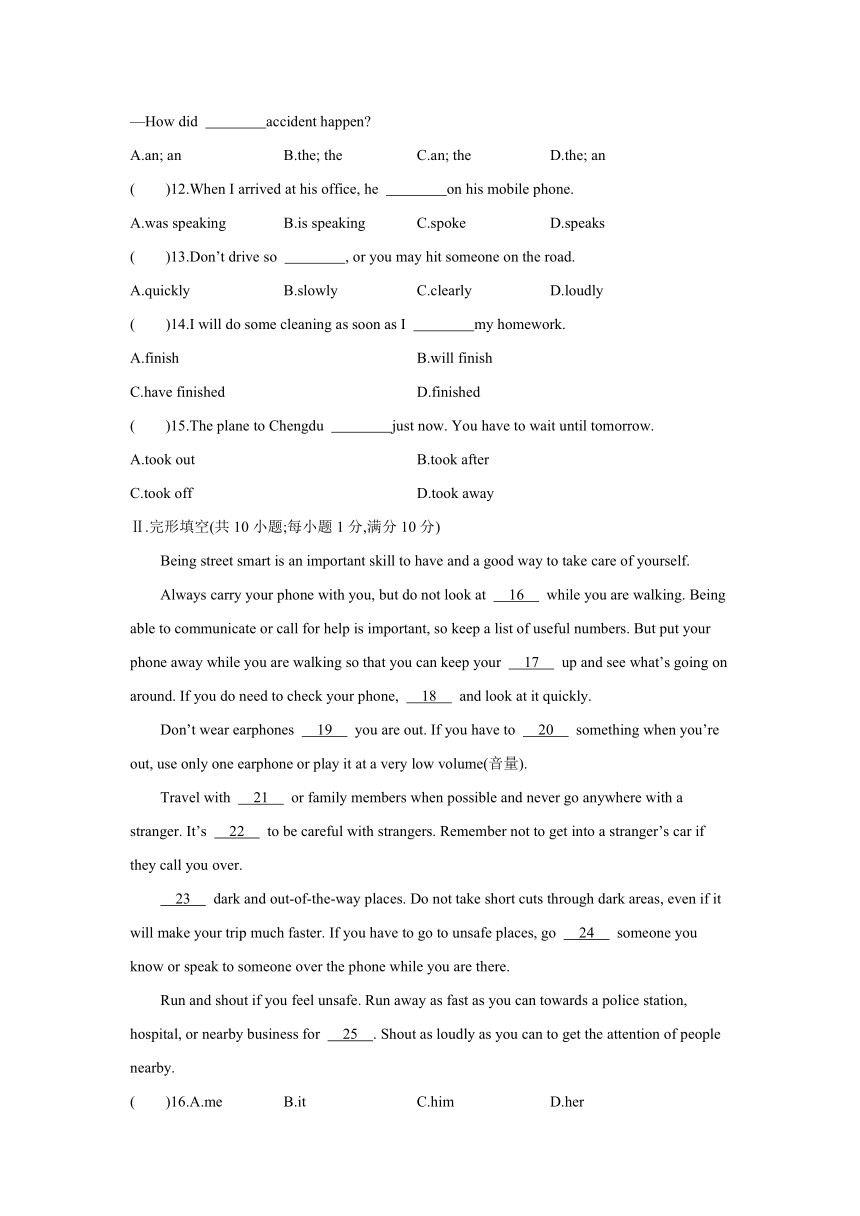
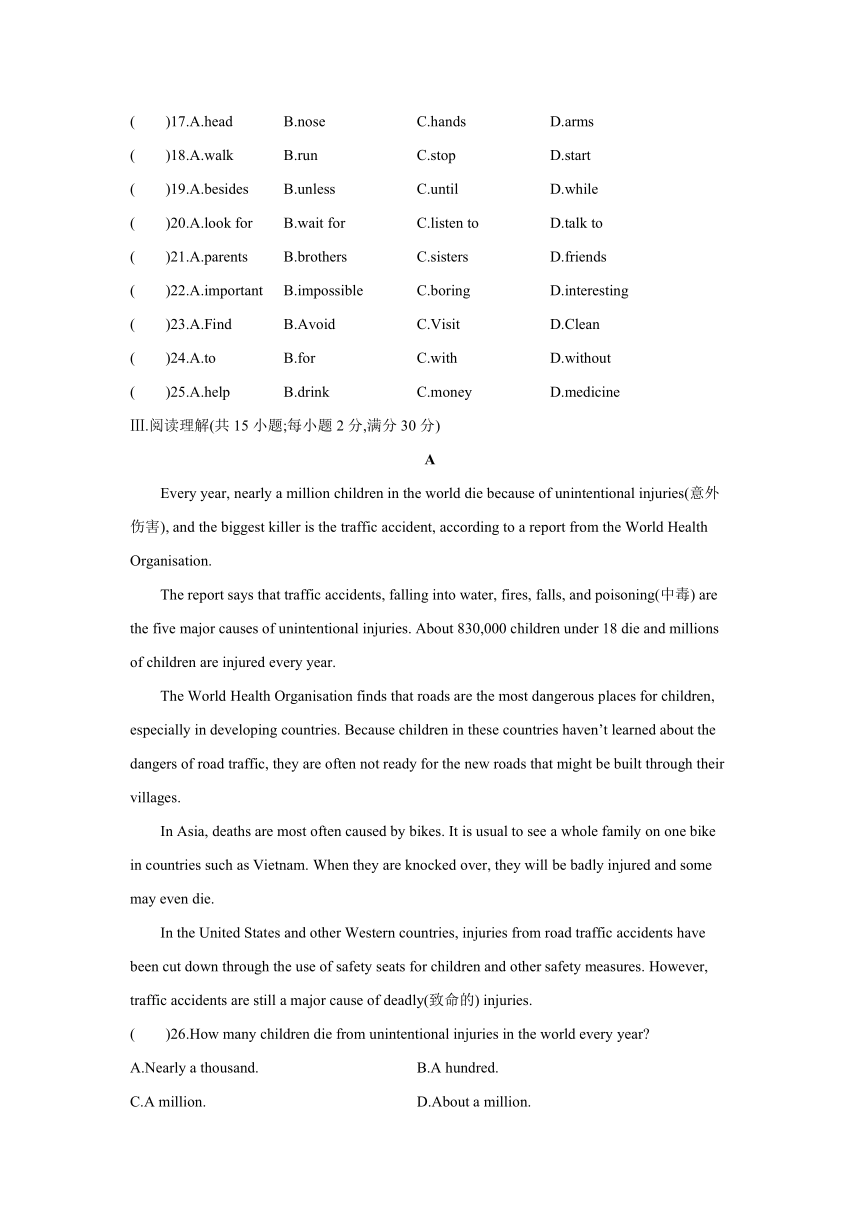
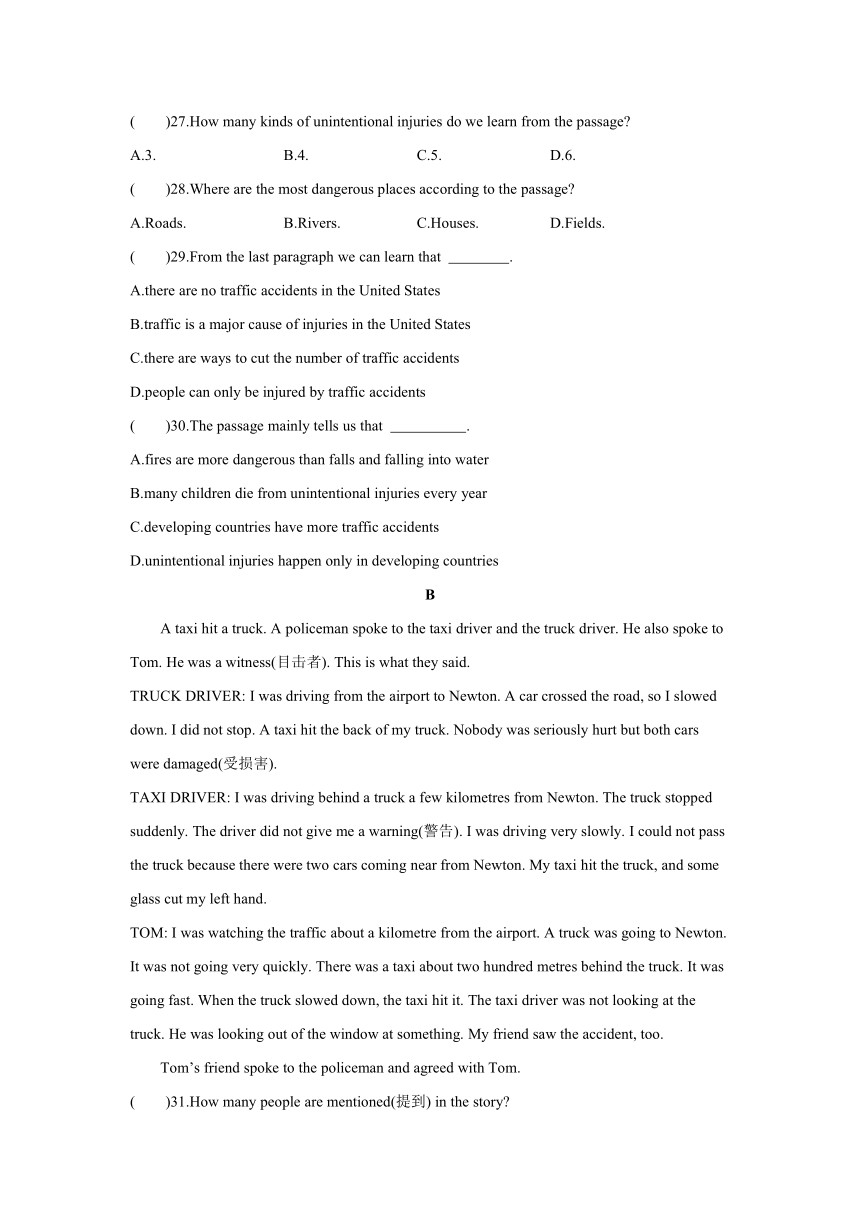
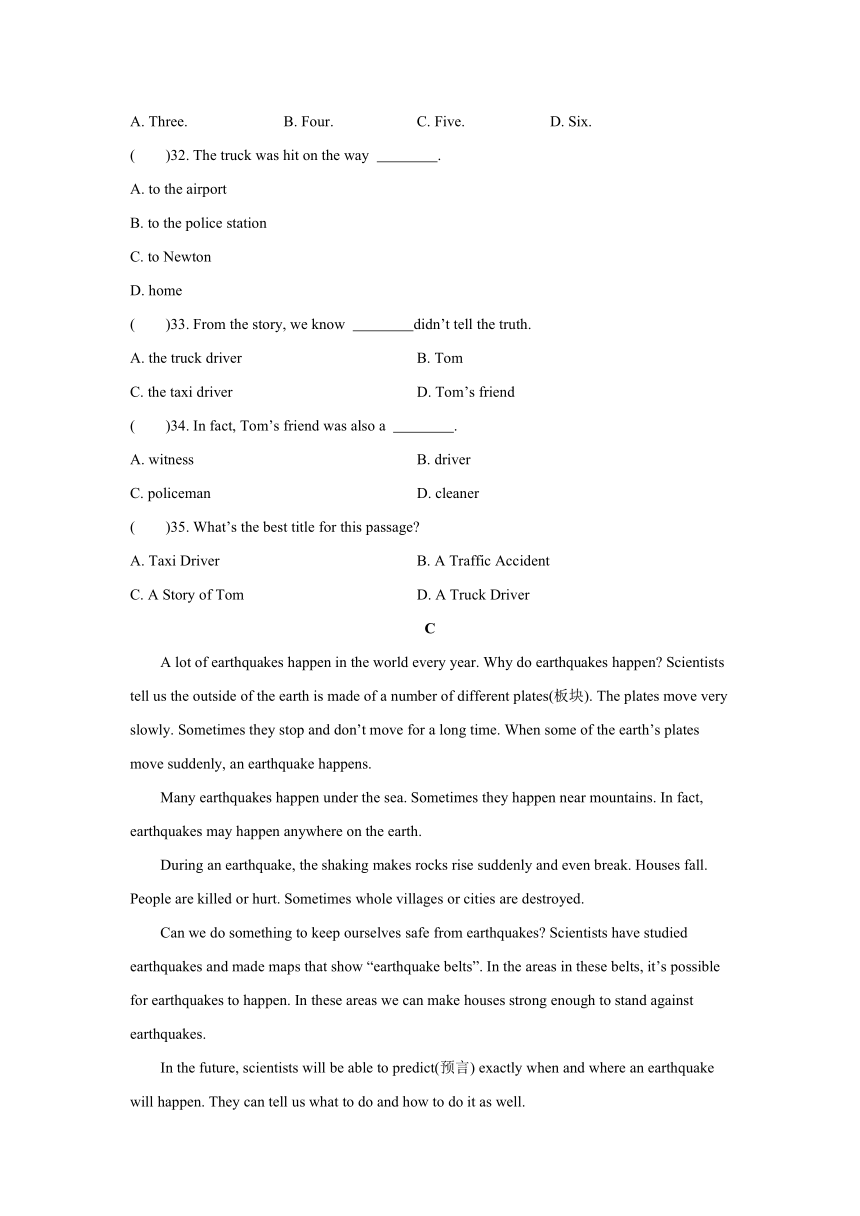
文档简介
Module 8 综合测试卷
第Ⅰ卷 (选择题,共计65分)
Ⅰ.单项选择(共15小题;每小题1分,满分15分)
( )1.The soldiers went to the other side of the street side side.?
A.by B.in C.to D.with
( )2.Karin found waste paper on the floor. She it and threw it into the dustbin. ?
A.put; up B.picked; up
C.turned; up D.looked; up
( )3.Linda looks because she isn’t feeling well.?
A.pleased B.pale C.glad D.friendly
( )4.We were dancing they were singing.?
A.if B.so C.while D.that
( )5.If you go out in such cold weather, there will be a of catching a cold.?
A.risk B.score C.meaning D.choice
( )6.Tears came into the nurse’s eyes, but she tried to her sadness.?
A.raise B.follow C.hide D.choose
( )7.The policeman asked him what he when the accident happened.?
A.was doing B.has done C.is doing D.does
( )8.The ambulance(救护车) got there just to save the child’s life.?
A.at times B.in time C.on time D.for a time
( )9.If you don’t pay more attention to , you’ll make mistakes.?
A.practise to speaking B.practising speak
C.practising speaking D.practise speaking
( )10.—More and more patients who caught the COVID -19 have been out of hospital.
—That’s true. .?
A.That’s a pity B.Don’t mention it
C.I’m glad to hear that D.You’re welcome
( )11.—Mike had accident this morning.?
—How did accident happen??
A.an; an B.the; the C.an; the D.the; an
( )12.When I arrived at his office, he on his mobile phone.?
A.was speaking B.is speaking C.spoke D.speaks
( )13.Don’t drive so , or you may hit someone on the road.?
A.quickly B.slowly C.clearly D.loudly
( )14.I will do some cleaning as soon as I my homework.?
A.finish B.will finish
C.have finished D.finished
( )15.The plane to Chengdu just now. You have to wait until tomorrow.?
A.took out B.took after
C.took off D.took away
Ⅱ.完形填空(共10小题;每小题1分,满分10分)
Being street smart is an important skill to have and a good way to take care of yourself.
Always carry your phone with you, but do not look at 16 while you are walking. Being able to communicate or call for help is important, so keep a list of useful numbers. But put your phone away while you are walking so that you can keep your 17 up and see what’s going on around. If you do need to check your phone, 18 and look at it quickly.?
Don’t wear earphones 19 you are out. If you have to 20 something when you’re out, use only one earphone or play it at a very low volume(音量).?
Travel with 21 or family members when possible and never go anywhere with a stranger. It’s 22 to be careful with strangers. Remember not to get into a stranger’s car if they call you over.?
23 dark and out-of-the-way places. Do not take short cuts through dark areas, even if it will make your trip much faster. If you have to go to unsafe places, go 24 someone you know or speak to someone over the phone while you are there.?
Run and shout if you feel unsafe. Run away as fast as you can towards a police station, hospital, or nearby business for 25 . Shout as loudly as you can to get the attention of people nearby.?
( )16.A.me B.it C.him D.her
( )17.A.head B.nose C.hands D.arms
( )18.A.walk B.run C.stop D.start
( )19.A.besides B.unless C.until D.while
( )20.A.look for B.wait for C.listen to D.talk to
( )21.A.parents B.brothers C.sisters D.friends
( )22.A.important B.impossible C.boring D.interesting
( )23.A.Find B.Avoid C.Visit D.Clean
( )24.A.to B.for C.with D.without
( )25.A.help B.drink C.money D.medicine
Ⅲ.阅读理解(共15小题;每小题2分,满分30分)
A
Every year, nearly a million children in the world die because of unintentional injuries(意外伤害), and the biggest killer is the traffic accident, according to a report from the World Health Organisation.
The report says that traffic accidents, falling into water, fires, falls, and poisoning(中毒) are the five major causes of unintentional injuries. About 830,000 children under 18 die and millions of children are injured every year.
The World Health Organisation finds that roads are the most dangerous places for children, especially in developing countries. Because children in these countries haven’t learned about the dangers of road traffic, they are often not ready for the new roads that might be built through their villages.
In Asia, deaths are most often caused by bikes. It is usual to see a whole family on one bike in countries such as Vietnam. When they are knocked over, they will be badly injured and some may even die.
In the United States and other Western countries, injuries from road traffic accidents have been cut down through the use of safety seats for children and other safety measures. However, traffic accidents are still a major cause of deadly(致命的) injuries.
( )26.How many children die from unintentional injuries in the world every year?
A.Nearly a thousand. B.A hundred.
C.A million. D.About a million.
( )27.How many kinds of unintentional injuries do we learn from the passage?
A.3. B.4. C.5. D.6.
( )28.Where are the most dangerous places according to the passage?
A.Roads. B.Rivers. C.Houses. D.Fields.
( )29.From the last paragraph we can learn that . ?
A.there are no traffic accidents in the United States
B.traffic is a major cause of injuries in the United States
C.there are ways to cut the number of traffic accidents
D.people can only be injured by traffic accidents
( )30.The passage mainly tells us that . ?
A.fires are more dangerous than falls and falling into water
B.many children die from unintentional injuries every year
C.developing countries have more traffic accidents
D.unintentional injuries happen only in developing countries
B
A taxi hit a truck. A policeman spoke to the taxi driver and the truck driver. He also spoke to Tom. He was a witness(目击者). This is what they said.
TRUCK DRIVER: I was driving from the airport to Newton. A car crossed the road, so I slowed down. I did not stop. A taxi hit the back of my truck. Nobody was seriously hurt but both cars were damaged(受损害).
TAXI DRIVER: I was driving behind a truck a few kilometres from Newton. The truck stopped suddenly. The driver did not give me a warning(警告). I was driving very slowly. I could not pass the truck because there were two cars coming near from Newton. My taxi hit the truck, and some glass cut my left hand.
TOM: I was watching the traffic about a kilometre from the airport. A truck was going to Newton. It was not going very quickly. There was a taxi about two hundred metres behind the truck. It was going fast. When the truck slowed down, the taxi hit it. The taxi driver was not looking at the truck. He was looking out of the window at something. My friend saw the accident, too.
Tom’s friend spoke to the policeman and agreed with Tom.
( )31.How many people are mentioned(提到) in the story?
A. Three. B. Four. C. Five. D. Six.
( )32. The truck was hit on the way .?
A. to the airport
B. to the police station
C. to Newton
D. home
( )33. From the story, we know didn’t tell the truth.?
A. the truck driver B. Tom
C. the taxi driver D. Tom’s friend
( )34. In fact, Tom’s friend was also a .?
A. witness B. driver
C. policeman D. cleaner
( )35. What’s the best title for this passage?
A. Taxi Driver B. A Traffic Accident
C. A Story of Tom D. A Truck Driver
C
A lot of earthquakes happen in the world every year. Why do earthquakes happen? Scientists tell us the outside of the earth is made of a number of different plates(板块). The plates move very slowly. Sometimes they stop and don’t move for a long time. When some of the earth’s plates move suddenly, an earthquake happens.
Many earthquakes happen under the sea. Sometimes they happen near mountains. In fact, earthquakes may happen anywhere on the earth.
During an earthquake, the shaking makes rocks rise suddenly and even break. Houses fall. People are killed or hurt. Sometimes whole villages or cities are destroyed.
Can we do something to keep ourselves safe from earthquakes? Scientists have studied earthquakes and made maps that show “earthquake belts”. In the areas in these belts, it’s possible for earthquakes to happen. In these areas we can make houses strong enough to stand against earthquakes.
In the future, scientists will be able to predict(预言) exactly when and where an earthquake will happen. They can tell us what to do and how to do it as well.
根据上文内容判断正(T)误(F)。
( )36.Few earthquakes happen in the world every year.
( )37.The outside of the earth is made of a number of different plates.
( )38.We can do nothing to keep ourselves safe from earthquakes.
( )39.A map showing the earthquake belts tells people what kind of houses can stand in an earthquake.
( )40.In the future, scientists can predict exactly when and where an earthquake will happen.
Ⅳ.补全对话,方框中有两个多余选项(共5小题;每小题2分,满分10分)
A: Hey, Nancy! Jack didn’t come to school today. 41. ?
B: He had an accident.
A: 42. ?
B: At about 7:00 this morning.
A: 43. ?
B: He was walking along the street. Then a car hit him.
A: Did the car stop?
B: No, it didn’t.
A: That’s too bad! 44. ?
B: Yes! He was hurt badly. And he needs to stay there for a long time.
A: I’m sorry to hear that. 45. ?
B: OK.
A.Where is Jack?
B.When did it happen?
C.What happened to him?
D.Is Jack in hospital?
E.How did he go to school?
F.What was he doing at that time?
G.How about seeing him this evening?
第Ⅱ卷 (非选择题,共计35分)
Ⅴ.用所给词或短语的适当形式填空(共10小题;每小题1分,满分10分)
a few days earlier, hide, cross, as soon as, hurry to, fall, two, deep, climb, risk
46.This morning John his company to work without breakfast.?
47.Mice usually in the holes in the day.?
48. Kate got a postcard from Alice.?
49.Mum asks me to do my homework first she gets home.?
50.He walked the footbridge.?
51.The ice is too thin for you to skate on it. You’d better not take the .?
52.When autumn comes, leaves begin to . ?
53.The old man drank a day before, but he gives up drinking now.?
54.Unluckily, the little girl fell into a very hole.?
55.Tony enjoys the mountains in his free time.?
Ⅵ.阅读理解填词(共10小题;每小题1分,满分10分)
The 56.a happened early this morning. I was waiting for the bus when it happened. A young woman was driving a red car very 57.f . While she was driving, she was talking over her mobile 58.p . At that moment, a man was driving an orange truck 59.a North Street very slowly. While he was driving, he was drinking a bottle of water and 60.e something. When they got to the crossing, the woman in the red car didn’t 61.s at the traffic lights. As a result, the car 62.h the truck. Both the woman and the man were very 63.a and they shouted at each other. Soon the police came. 64.L , they were not badly hurt. And they each got a fine for 65.b the traffic rules.?
Ⅶ.书面表达(满分15分)
每年的夏天,溺水事故频发。请你就此写一篇短文谈谈你的看法。80词左右。内容包括:
1.我们应该如何预防此类事故发生?(两点建议)
2.如果看到有人落水,我们应该如何正确施救?
3.呼吁同学们热爱生命,注意安全。
?
?
?
答案
Ⅰ.1.A 2.B 3.B 4.C 5.A 6.C
7.A 8.B 9.C 10.C
11.C 句意:“今天早上迈克发生了一起交通事故。”“这起事故是怎么发生的?”第一个空表示一起事故,故用不定冠词,accident以元音音素开头,应用an;第二个空特指前面提到的这起事故,故用定冠词the。故选C。
12.A
13.A 考查副词辨析。quickly意为“快地”;slowly意为“慢地”;clearly意为“清楚地”;loudly意为“大声地”。根据 “or you may hit someone on the road” 可知,前句是建议不要开太快。故选A。
14.A 在含有as soon as 引导的时间状语从句的复合句中,句子的时态要遵循 “主将从现” 的原则,所以从句应用一般现在时。故选A。
15.C 考查动词短语辨析。take out意为“取出;切除”;take after意为“与……像”;take off意为“起飞;脱下”;take away意为“带走”。根据 “You have to wait until tomorrow.” 可知飞机飞走了。故选C。
Ⅱ.【主旨大意】 本文是一篇说明文。文中主要讲述了在街上保护好自己的几种方法,如随身携带手机,尽量不用或少用耳机,和朋友或家人一起出行,远离黑暗和偏僻的地方,遇到危险时大声求救等。
16.B 考查代词辨析。me意为“我”;it意为“它”;him意为“他”;her意为“她”。分析语境可知,此空是指代前面的“your phone”。故选B。
17.A 考查名词辨析。head意为“头”;nose意为“鼻子”;hand意为“手”;arm意为“胳膊”。由常识知,我们低着头看手机。联系上文“put your phone away while you are walking(走路的时候把手机收起来)”可知,我们会抬起“头”。故选A。
18.C 考查动词辨析。walk意为“步行”;run意为“跑,奔”;stop意为“停止”;start意为“开始”。联系上文“put your phone away while you are walking(走路的时候把手机收起来)”可知,看手机的时候应该“停下来”。故选C。
19.D 考查连词辨析。句意:不要戴耳机 你在外面。besides意为“除……之外”;unless意为“除非”;until意为“直到……为止”;while意为“当……时”。故选D。?
20.C 考查动词短语辨析。look for意为“寻找”;wait for意为“等待”;listen to意为“听”;talk to意为“与……交谈”。联系下文“use only one earphone or play it at a very low volume(只用一只耳机或把音量调很低)”可知,这里指“听东西”。故选C。
21.D
22.A 考查形容词辨析。important意为“重要的”;impossible意为“不可能”;boring意为“无聊的”;interesting意为“有趣的”。联系句意及前文“never go anywhere with a stranger”可知,此处指“小心陌生人很重要”。故选A。
23.B 考查动词辨析。find意为“找到”;avoid意为“避免;避开”;visit意为“参观”;clean意为“打扫”。联系上文及常识可知,为了安全,我们要“避开”黑暗和偏僻的地方。故选B。
24.C
25.A 考查名词辨析。help意为“帮助”;drink意为“饮料”;money意为“钱”;medicine意为“药”。联系上文及常识可知,遇到危险时要跑得越快越好,到警察局、医院或附近的商店寻求“帮助”。故选A。
Ⅲ.A 26.D 细节理解题。根据第一段中“Every year,nearly a million children in the world die because of unintentional injuries”可知,每年有近一百万儿童死于意外伤害,故选D。
27.C 细节理解题。根据第二段中 “The report says that traffic accidents,falling into water, fires, falls, and poisoning are the five major causes of unintentional injuries.” 可知,本文提到了五类意外伤害,故选C。
28.A 细节理解题。根据第三段中 “The World Health Organisation finds that roads are the most dangerous places for children” 可知,对儿童来说,道路是最危险的地方,故选A。
29.C 细节理解题。根据最后一段中 “In the United States and other Western countries,injuries from road traffic accidents have been cut down through the use of safety seats for children and other safety measures.” 可知,美国采取方法减少了交通事故的发生,故选C。
30.B 主旨大意题。文章主要讲述了每年都有大量的儿童死于意外事故,故选B。
B 【主旨大意】 本文描述的是一起交通事故:一辆出租车撞了一辆卡车,并提供了两位司机和一位目击者的证词。
31.C 推理判断题。通读文章可知出现的人物有警察、出租车司机、卡车司机、Tom和他的一名朋友,共5人。故选C。
32.C 细节理解题。根据卡车司机所说的“I was driving from the airport to Newton.”可知,卡车司机正开车从机场前往牛顿。故选C。
33.C 推理判断题。根据Tom所说的“The taxi driver was not looking at the truck. He was looking out of the window at something.”可知,当时出租车司机没有看卡车,他朝车窗外看着什么东西;再结合出租车司机的证言可推知,出租车司机说谎。故选C。
34.A 细节理解题。根据Tom所说的“My friend saw the accident, too.”可知,Tom的朋友也目睹了这场事故。故选A。
35.B 标题归纳题。通读全文可知,文章介绍的是一起交通事故。故选B。
C 36—40 FTFFT
Ⅳ.41—45 CBFDG
Ⅴ.46.hurried to 47.hide
48.A few days earlier 49.as soon as
50.across 51.risk 52.fall 53.twice
54.deep 55.climbing
Ⅵ.56.accident 57.fast
58.phone 59.along
60.eating 61.stop
62.hit 63.angry
64.Luckily 65.breaking
Ⅶ.One possible version:
Almost every year in summer, many people are reported dead from drowning accidents. How to prevent such sad accidents? In my opinion, first, we shouldn’t go swimming in dangerous places or places we know little about, such as reservoirs and rivers. Second, we had better not swim when we feel tired or hungry.
If we see someone fall into the water, we should save him in a proper way. For example, we can shout as loudly as we can to get those people with good swimming skills to help him.
Life is valuable. We should take it seriously. We must remember that safety should always come first while swimming.
第Ⅰ卷 (选择题,共计65分)
Ⅰ.单项选择(共15小题;每小题1分,满分15分)
( )1.The soldiers went to the other side of the street side side.?
A.by B.in C.to D.with
( )2.Karin found waste paper on the floor. She it and threw it into the dustbin. ?
A.put; up B.picked; up
C.turned; up D.looked; up
( )3.Linda looks because she isn’t feeling well.?
A.pleased B.pale C.glad D.friendly
( )4.We were dancing they were singing.?
A.if B.so C.while D.that
( )5.If you go out in such cold weather, there will be a of catching a cold.?
A.risk B.score C.meaning D.choice
( )6.Tears came into the nurse’s eyes, but she tried to her sadness.?
A.raise B.follow C.hide D.choose
( )7.The policeman asked him what he when the accident happened.?
A.was doing B.has done C.is doing D.does
( )8.The ambulance(救护车) got there just to save the child’s life.?
A.at times B.in time C.on time D.for a time
( )9.If you don’t pay more attention to , you’ll make mistakes.?
A.practise to speaking B.practising speak
C.practising speaking D.practise speaking
( )10.—More and more patients who caught the COVID -19 have been out of hospital.
—That’s true. .?
A.That’s a pity B.Don’t mention it
C.I’m glad to hear that D.You’re welcome
( )11.—Mike had accident this morning.?
—How did accident happen??
A.an; an B.the; the C.an; the D.the; an
( )12.When I arrived at his office, he on his mobile phone.?
A.was speaking B.is speaking C.spoke D.speaks
( )13.Don’t drive so , or you may hit someone on the road.?
A.quickly B.slowly C.clearly D.loudly
( )14.I will do some cleaning as soon as I my homework.?
A.finish B.will finish
C.have finished D.finished
( )15.The plane to Chengdu just now. You have to wait until tomorrow.?
A.took out B.took after
C.took off D.took away
Ⅱ.完形填空(共10小题;每小题1分,满分10分)
Being street smart is an important skill to have and a good way to take care of yourself.
Always carry your phone with you, but do not look at 16 while you are walking. Being able to communicate or call for help is important, so keep a list of useful numbers. But put your phone away while you are walking so that you can keep your 17 up and see what’s going on around. If you do need to check your phone, 18 and look at it quickly.?
Don’t wear earphones 19 you are out. If you have to 20 something when you’re out, use only one earphone or play it at a very low volume(音量).?
Travel with 21 or family members when possible and never go anywhere with a stranger. It’s 22 to be careful with strangers. Remember not to get into a stranger’s car if they call you over.?
23 dark and out-of-the-way places. Do not take short cuts through dark areas, even if it will make your trip much faster. If you have to go to unsafe places, go 24 someone you know or speak to someone over the phone while you are there.?
Run and shout if you feel unsafe. Run away as fast as you can towards a police station, hospital, or nearby business for 25 . Shout as loudly as you can to get the attention of people nearby.?
( )16.A.me B.it C.him D.her
( )17.A.head B.nose C.hands D.arms
( )18.A.walk B.run C.stop D.start
( )19.A.besides B.unless C.until D.while
( )20.A.look for B.wait for C.listen to D.talk to
( )21.A.parents B.brothers C.sisters D.friends
( )22.A.important B.impossible C.boring D.interesting
( )23.A.Find B.Avoid C.Visit D.Clean
( )24.A.to B.for C.with D.without
( )25.A.help B.drink C.money D.medicine
Ⅲ.阅读理解(共15小题;每小题2分,满分30分)
A
Every year, nearly a million children in the world die because of unintentional injuries(意外伤害), and the biggest killer is the traffic accident, according to a report from the World Health Organisation.
The report says that traffic accidents, falling into water, fires, falls, and poisoning(中毒) are the five major causes of unintentional injuries. About 830,000 children under 18 die and millions of children are injured every year.
The World Health Organisation finds that roads are the most dangerous places for children, especially in developing countries. Because children in these countries haven’t learned about the dangers of road traffic, they are often not ready for the new roads that might be built through their villages.
In Asia, deaths are most often caused by bikes. It is usual to see a whole family on one bike in countries such as Vietnam. When they are knocked over, they will be badly injured and some may even die.
In the United States and other Western countries, injuries from road traffic accidents have been cut down through the use of safety seats for children and other safety measures. However, traffic accidents are still a major cause of deadly(致命的) injuries.
( )26.How many children die from unintentional injuries in the world every year?
A.Nearly a thousand. B.A hundred.
C.A million. D.About a million.
( )27.How many kinds of unintentional injuries do we learn from the passage?
A.3. B.4. C.5. D.6.
( )28.Where are the most dangerous places according to the passage?
A.Roads. B.Rivers. C.Houses. D.Fields.
( )29.From the last paragraph we can learn that . ?
A.there are no traffic accidents in the United States
B.traffic is a major cause of injuries in the United States
C.there are ways to cut the number of traffic accidents
D.people can only be injured by traffic accidents
( )30.The passage mainly tells us that . ?
A.fires are more dangerous than falls and falling into water
B.many children die from unintentional injuries every year
C.developing countries have more traffic accidents
D.unintentional injuries happen only in developing countries
B
A taxi hit a truck. A policeman spoke to the taxi driver and the truck driver. He also spoke to Tom. He was a witness(目击者). This is what they said.
TRUCK DRIVER: I was driving from the airport to Newton. A car crossed the road, so I slowed down. I did not stop. A taxi hit the back of my truck. Nobody was seriously hurt but both cars were damaged(受损害).
TAXI DRIVER: I was driving behind a truck a few kilometres from Newton. The truck stopped suddenly. The driver did not give me a warning(警告). I was driving very slowly. I could not pass the truck because there were two cars coming near from Newton. My taxi hit the truck, and some glass cut my left hand.
TOM: I was watching the traffic about a kilometre from the airport. A truck was going to Newton. It was not going very quickly. There was a taxi about two hundred metres behind the truck. It was going fast. When the truck slowed down, the taxi hit it. The taxi driver was not looking at the truck. He was looking out of the window at something. My friend saw the accident, too.
Tom’s friend spoke to the policeman and agreed with Tom.
( )31.How many people are mentioned(提到) in the story?
A. Three. B. Four. C. Five. D. Six.
( )32. The truck was hit on the way .?
A. to the airport
B. to the police station
C. to Newton
D. home
( )33. From the story, we know didn’t tell the truth.?
A. the truck driver B. Tom
C. the taxi driver D. Tom’s friend
( )34. In fact, Tom’s friend was also a .?
A. witness B. driver
C. policeman D. cleaner
( )35. What’s the best title for this passage?
A. Taxi Driver B. A Traffic Accident
C. A Story of Tom D. A Truck Driver
C
A lot of earthquakes happen in the world every year. Why do earthquakes happen? Scientists tell us the outside of the earth is made of a number of different plates(板块). The plates move very slowly. Sometimes they stop and don’t move for a long time. When some of the earth’s plates move suddenly, an earthquake happens.
Many earthquakes happen under the sea. Sometimes they happen near mountains. In fact, earthquakes may happen anywhere on the earth.
During an earthquake, the shaking makes rocks rise suddenly and even break. Houses fall. People are killed or hurt. Sometimes whole villages or cities are destroyed.
Can we do something to keep ourselves safe from earthquakes? Scientists have studied earthquakes and made maps that show “earthquake belts”. In the areas in these belts, it’s possible for earthquakes to happen. In these areas we can make houses strong enough to stand against earthquakes.
In the future, scientists will be able to predict(预言) exactly when and where an earthquake will happen. They can tell us what to do and how to do it as well.
根据上文内容判断正(T)误(F)。
( )36.Few earthquakes happen in the world every year.
( )37.The outside of the earth is made of a number of different plates.
( )38.We can do nothing to keep ourselves safe from earthquakes.
( )39.A map showing the earthquake belts tells people what kind of houses can stand in an earthquake.
( )40.In the future, scientists can predict exactly when and where an earthquake will happen.
Ⅳ.补全对话,方框中有两个多余选项(共5小题;每小题2分,满分10分)
A: Hey, Nancy! Jack didn’t come to school today. 41. ?
B: He had an accident.
A: 42. ?
B: At about 7:00 this morning.
A: 43. ?
B: He was walking along the street. Then a car hit him.
A: Did the car stop?
B: No, it didn’t.
A: That’s too bad! 44. ?
B: Yes! He was hurt badly. And he needs to stay there for a long time.
A: I’m sorry to hear that. 45. ?
B: OK.
A.Where is Jack?
B.When did it happen?
C.What happened to him?
D.Is Jack in hospital?
E.How did he go to school?
F.What was he doing at that time?
G.How about seeing him this evening?
第Ⅱ卷 (非选择题,共计35分)
Ⅴ.用所给词或短语的适当形式填空(共10小题;每小题1分,满分10分)
a few days earlier, hide, cross, as soon as, hurry to, fall, two, deep, climb, risk
46.This morning John his company to work without breakfast.?
47.Mice usually in the holes in the day.?
48. Kate got a postcard from Alice.?
49.Mum asks me to do my homework first she gets home.?
50.He walked the footbridge.?
51.The ice is too thin for you to skate on it. You’d better not take the .?
52.When autumn comes, leaves begin to . ?
53.The old man drank a day before, but he gives up drinking now.?
54.Unluckily, the little girl fell into a very hole.?
55.Tony enjoys the mountains in his free time.?
Ⅵ.阅读理解填词(共10小题;每小题1分,满分10分)
The 56.a happened early this morning. I was waiting for the bus when it happened. A young woman was driving a red car very 57.f . While she was driving, she was talking over her mobile 58.p . At that moment, a man was driving an orange truck 59.a North Street very slowly. While he was driving, he was drinking a bottle of water and 60.e something. When they got to the crossing, the woman in the red car didn’t 61.s at the traffic lights. As a result, the car 62.h the truck. Both the woman and the man were very 63.a and they shouted at each other. Soon the police came. 64.L , they were not badly hurt. And they each got a fine for 65.b the traffic rules.?
Ⅶ.书面表达(满分15分)
每年的夏天,溺水事故频发。请你就此写一篇短文谈谈你的看法。80词左右。内容包括:
1.我们应该如何预防此类事故发生?(两点建议)
2.如果看到有人落水,我们应该如何正确施救?
3.呼吁同学们热爱生命,注意安全。
?
?
?
答案
Ⅰ.1.A 2.B 3.B 4.C 5.A 6.C
7.A 8.B 9.C 10.C
11.C 句意:“今天早上迈克发生了一起交通事故。”“这起事故是怎么发生的?”第一个空表示一起事故,故用不定冠词,accident以元音音素开头,应用an;第二个空特指前面提到的这起事故,故用定冠词the。故选C。
12.A
13.A 考查副词辨析。quickly意为“快地”;slowly意为“慢地”;clearly意为“清楚地”;loudly意为“大声地”。根据 “or you may hit someone on the road” 可知,前句是建议不要开太快。故选A。
14.A 在含有as soon as 引导的时间状语从句的复合句中,句子的时态要遵循 “主将从现” 的原则,所以从句应用一般现在时。故选A。
15.C 考查动词短语辨析。take out意为“取出;切除”;take after意为“与……像”;take off意为“起飞;脱下”;take away意为“带走”。根据 “You have to wait until tomorrow.” 可知飞机飞走了。故选C。
Ⅱ.【主旨大意】 本文是一篇说明文。文中主要讲述了在街上保护好自己的几种方法,如随身携带手机,尽量不用或少用耳机,和朋友或家人一起出行,远离黑暗和偏僻的地方,遇到危险时大声求救等。
16.B 考查代词辨析。me意为“我”;it意为“它”;him意为“他”;her意为“她”。分析语境可知,此空是指代前面的“your phone”。故选B。
17.A 考查名词辨析。head意为“头”;nose意为“鼻子”;hand意为“手”;arm意为“胳膊”。由常识知,我们低着头看手机。联系上文“put your phone away while you are walking(走路的时候把手机收起来)”可知,我们会抬起“头”。故选A。
18.C 考查动词辨析。walk意为“步行”;run意为“跑,奔”;stop意为“停止”;start意为“开始”。联系上文“put your phone away while you are walking(走路的时候把手机收起来)”可知,看手机的时候应该“停下来”。故选C。
19.D 考查连词辨析。句意:不要戴耳机 你在外面。besides意为“除……之外”;unless意为“除非”;until意为“直到……为止”;while意为“当……时”。故选D。?
20.C 考查动词短语辨析。look for意为“寻找”;wait for意为“等待”;listen to意为“听”;talk to意为“与……交谈”。联系下文“use only one earphone or play it at a very low volume(只用一只耳机或把音量调很低)”可知,这里指“听东西”。故选C。
21.D
22.A 考查形容词辨析。important意为“重要的”;impossible意为“不可能”;boring意为“无聊的”;interesting意为“有趣的”。联系句意及前文“never go anywhere with a stranger”可知,此处指“小心陌生人很重要”。故选A。
23.B 考查动词辨析。find意为“找到”;avoid意为“避免;避开”;visit意为“参观”;clean意为“打扫”。联系上文及常识可知,为了安全,我们要“避开”黑暗和偏僻的地方。故选B。
24.C
25.A 考查名词辨析。help意为“帮助”;drink意为“饮料”;money意为“钱”;medicine意为“药”。联系上文及常识可知,遇到危险时要跑得越快越好,到警察局、医院或附近的商店寻求“帮助”。故选A。
Ⅲ.A 26.D 细节理解题。根据第一段中“Every year,nearly a million children in the world die because of unintentional injuries”可知,每年有近一百万儿童死于意外伤害,故选D。
27.C 细节理解题。根据第二段中 “The report says that traffic accidents,falling into water, fires, falls, and poisoning are the five major causes of unintentional injuries.” 可知,本文提到了五类意外伤害,故选C。
28.A 细节理解题。根据第三段中 “The World Health Organisation finds that roads are the most dangerous places for children” 可知,对儿童来说,道路是最危险的地方,故选A。
29.C 细节理解题。根据最后一段中 “In the United States and other Western countries,injuries from road traffic accidents have been cut down through the use of safety seats for children and other safety measures.” 可知,美国采取方法减少了交通事故的发生,故选C。
30.B 主旨大意题。文章主要讲述了每年都有大量的儿童死于意外事故,故选B。
B 【主旨大意】 本文描述的是一起交通事故:一辆出租车撞了一辆卡车,并提供了两位司机和一位目击者的证词。
31.C 推理判断题。通读文章可知出现的人物有警察、出租车司机、卡车司机、Tom和他的一名朋友,共5人。故选C。
32.C 细节理解题。根据卡车司机所说的“I was driving from the airport to Newton.”可知,卡车司机正开车从机场前往牛顿。故选C。
33.C 推理判断题。根据Tom所说的“The taxi driver was not looking at the truck. He was looking out of the window at something.”可知,当时出租车司机没有看卡车,他朝车窗外看着什么东西;再结合出租车司机的证言可推知,出租车司机说谎。故选C。
34.A 细节理解题。根据Tom所说的“My friend saw the accident, too.”可知,Tom的朋友也目睹了这场事故。故选A。
35.B 标题归纳题。通读全文可知,文章介绍的是一起交通事故。故选B。
C 36—40 FTFFT
Ⅳ.41—45 CBFDG
Ⅴ.46.hurried to 47.hide
48.A few days earlier 49.as soon as
50.across 51.risk 52.fall 53.twice
54.deep 55.climbing
Ⅵ.56.accident 57.fast
58.phone 59.along
60.eating 61.stop
62.hit 63.angry
64.Luckily 65.breaking
Ⅶ.One possible version:
Almost every year in summer, many people are reported dead from drowning accidents. How to prevent such sad accidents? In my opinion, first, we shouldn’t go swimming in dangerous places or places we know little about, such as reservoirs and rivers. Second, we had better not swim when we feel tired or hungry.
If we see someone fall into the water, we should save him in a proper way. For example, we can shout as loudly as we can to get those people with good swimming skills to help him.
Life is valuable. We should take it seriously. We must remember that safety should always come first while swimming.
同课章节目录
- Module 1 How to learn English
- Unit 1 Let's try to speak English as much as possi
- Unit 2 You should smile at her.
- Unit 3 Language in use .
- Module 2 My home town and my country
- Unit 1 It's taller than many other buildings.
- Unit 2 Cambridge is a beautiful city in the east o
- Unit 3 Language in use .
- Module 3 Sports.
- Unit 1 Nothing is more exciting than playing tenni
- Unit 2 This year we training more carefully.
- Unit 3 Language in use .
- Module 4 Planes, ships and trains .
- Unit 1 He lives the farthest from school.
- Unit 2 What is the best way to travel.
- Unit 3 Language in use .
- Module 5 Lao She Teahouse.
- Unit 1 I wanted to see the Beijing Opera.
- Unit 2 It descibes the changes in Chinese society.
- Unit 3 Language in use .
- Module 6 Animals in danger.
- Unit 1 It allows people to get closer to them .
- Unit 2 The WWF is working hard to save them all.
- Unit 3 Language in use .
- Revision module A
- Module 7 A famous story
- Unit 1 Alice was sitting with her sister by the ri
- Unit 2 She was thinking about her cat.
- Unit 3 Language in use .
- Module 8 Accidents
- Unit 1 While the car were changing to red, a car s
- Unit 2 I was trying to pick it up when it bite me
- Unit 3 Language in use .
- Module 9 Population
- Unit 1 The population of China is about 1.37 billi
- Unit 2 Arnwick was a city with 200,000 people.
- Unit 3 Language in use .
- Module 10 The weathe
- Unit 1 It might snow.
- Unit 2 The weather is fine all year round.
- Unit 3 Language in use .
- Module 11 Way of life
- Unit 1 In China ,we open a gift later.
- Unit 2 In England, you usually drink tea with milk
- Unit 3 Language in use .
- Module 12 Help
- Unit 1 What should we do before help arrives?
- Unit 2 Stay away from windows and heavy furniture.
- Unit 3 Language in use .
- Revision module B
